William Clarke (musician)
| William Clarke | |
|---|---|

Clarke on Bluesnews cover
|
|
| Background information | |
| Born |
March 21, 1951 Inglewood, California, U.S. |
| Died | November 2, 1996 (aged 45) Fresno, California |
| Genres | Blues |
| Occupation(s) | Musician |
| Instruments |
|
| Years active | 1969–1996 |
| Labels | Alligator |
| Associated acts | George "Harmonica" Smith, Hollywood Fats |
William Clarke (March 21, 1951 – November 2, 1996) was an American blues harmonica player and singer. He was chiefly associated with the Chicago blues style of amplified harmonica, but also incorporated elements of jump blues, swing, and soul jazz into his playing. Clarke was a master of both cross and chromatic harmonica styles and many consider him among the blues harmonica greats.
Clarke was born in Inglewood, California, on March 21, 1951. In 1967, he began playing harmonica and was soon performing in Los Angeles-area clubs. He struck up an association with blues harmonica virtuoso George "Harmonica" Smith and the two began playing regularly together in 1977; their partnership lasted until Smith died in 1983.
In 1978, Clarke recorded his first album, Hittin' Heavy. Other albums on small labels followed, including Blues from Los Angeles (1980) and Can't You Hear Me Calling (1983). Los Angeles blues musicians Hollywood Fats, Junior Watson, and others backed Clarke for two of his 1980s albums on Rivera Records, which are considered classics. From 1985 to 1988, he toured with Rick Holmstrom. His 1987 album Tip of the Top was nominated for a W.C. Handy Award. Clarke sent a demo tape to Alligator Records, who subsequently offered him a recording contract.Blowin' Like Hell, his debut for Alligator, was released in 1990, and he followed the release with international touring. "Must Be Jelly", a song from the album, won a Handy award for "Blues Song of the Year". Several well-received albums for Alligator followed; 1996's The Hard Way received a Handy award for "Best Contemporary Blues album".
Clarke's lifestyle and constant touring led to health problems. After collapsing onstage in Indianapolis, Indiana, he took steps to improve his health. However, he died after a performance in Fresno, California, on November 2, 1997.Dick Shurman, a blues writer and producer, commented:
...
Wikipedia
